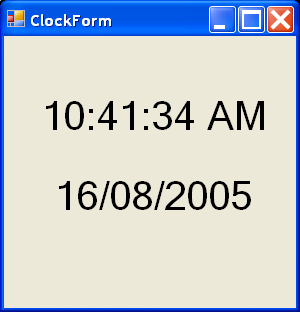GUI and timer

/*
C# Programming Tips & Techniques
by Charles Wright, Kris Jamsa
Publisher: Osborne/McGraw-Hill (December 28, 2001)
ISBN: 0072193794
*/
using System;
using System.Drawing;
using System.Collections;
using System.ComponentModel;
using System.Windows.Forms;
using System.Data;
namespace Clock
{
/// <summary>
/// Summary description for ClockForm.
/// </summary>
public class ClockForm : System.Windows.Forms.Form
{
private System.Windows.Forms.Label label1;
private System.Windows.Forms.Timer timer1;
private System.Windows.Forms.Label label2;
private System.ComponentModel.IContainer components;
#region ClockForm Constructor
public ClockForm()
{
//
// Required for Windows Form Designer support
//
InitializeComponent();
//
// TODO: Add any constructor code after InitializeComponent call
//
// The following line sets the text for the label box.
// To display no text, simply use two quote marks.
label1.Text = "";
// The following two statements set the text size and
// cause the time to appear centered in the label box
label1.Font = new System.Drawing.Font
("Microsoft Sans Serif", 24);
label1.TextAlign = ContentAlignment.MiddleCenter;
label2.Font = label1.Font;
label2.TextAlign = ContentAlignment.MiddleCenter;
// This.Text is the text that will appear in the form's
// title bar.
// this.Text = "My Clock";
// The following three lines set the timer to tick
// every second (1000 milliseconds), start the timer and
// write the initial time to the label box
timer1.Interval = 1000;
timer1.Start ();
SetClock ();
}
#endregion
/// <summary>
/// Clean up any resources being used.
/// </summary>
protected override void Dispose( bool disposing )
{
if( disposing )
{
if (components != null)
{
components.Dispose();
}
}
base.Dispose( disposing );
}
#region Windows Form Designer generated code
/// <summary>
/// Required method for Designer support - do not modify
/// the contents of this method with the code editor.
/// </summary>
private void InitializeComponent()
{
this.components = new System.ComponentModel.Container();
this.timer1 = new System.Windows.Forms.Timer(this.components);
this.label1 = new System.Windows.Forms.Label();
this.label2 = new System.Windows.Forms.Label();
this.SuspendLayout();
//
// timer1
//
this.timer1.Tick += new System.EventHandler(this.timer1_Tick);
//
// label1
//
this.label1.Font = new System.Drawing.Font("Microsoft Sans Serif", 24F, System.Drawing.FontStyle.Regular, System.Drawing.GraphicsUnit.Point, ((System.Byte)(0)));
this.label1.Location = new System.Drawing.Point(24, 56);
this.label1.Name = "label1";
this.label1.Size = new System.Drawing.Size(248, 48);
this.label1.TabIndex = 0;
this.label1.Text = "label1";
//
// label2
//
this.label2.Font = new System.Drawing.Font("Microsoft Sans Serif", 24F, System.Drawing.FontStyle.Regular, System.Drawing.GraphicsUnit.Point, ((System.Byte)(0)));
this.label2.Location = new System.Drawing.Point(24, 136);
this.label2.Name = "label2";
this.label2.Size = new System.Drawing.Size(248, 48);
this.label2.TabIndex = 1;
this.label2.Text = "label2";
//
// ClockForm
//
this.AutoScaleBaseSize = new System.Drawing.Size(6, 15);
this.ClientSize = new System.Drawing.Size(292, 272);
this.Controls.AddRange(new System.Windows.Forms.Control[] {
this.label2,
this.label1});
this.Name = "ClockForm";
this.Text = "ClockForm";
this.ResumeLayout(false);
}
#endregion
/// <summary>
/// The main entry point for the application.
/// </summary>
[STAThread]
static void Main()
{
Application.Run(new ClockForm());
}
private void timer1_Tick(object sender, System.EventArgs e)
{
SetClock ();
}
protected void SetClock ()
{
string str = DateTime.Now.ToString();
int index = str.IndexOf (" ");
label1.Text = str.Substring (index + 1);
label2.Text = str.Substring (0, index);
}
}
}
Related examples in the same category